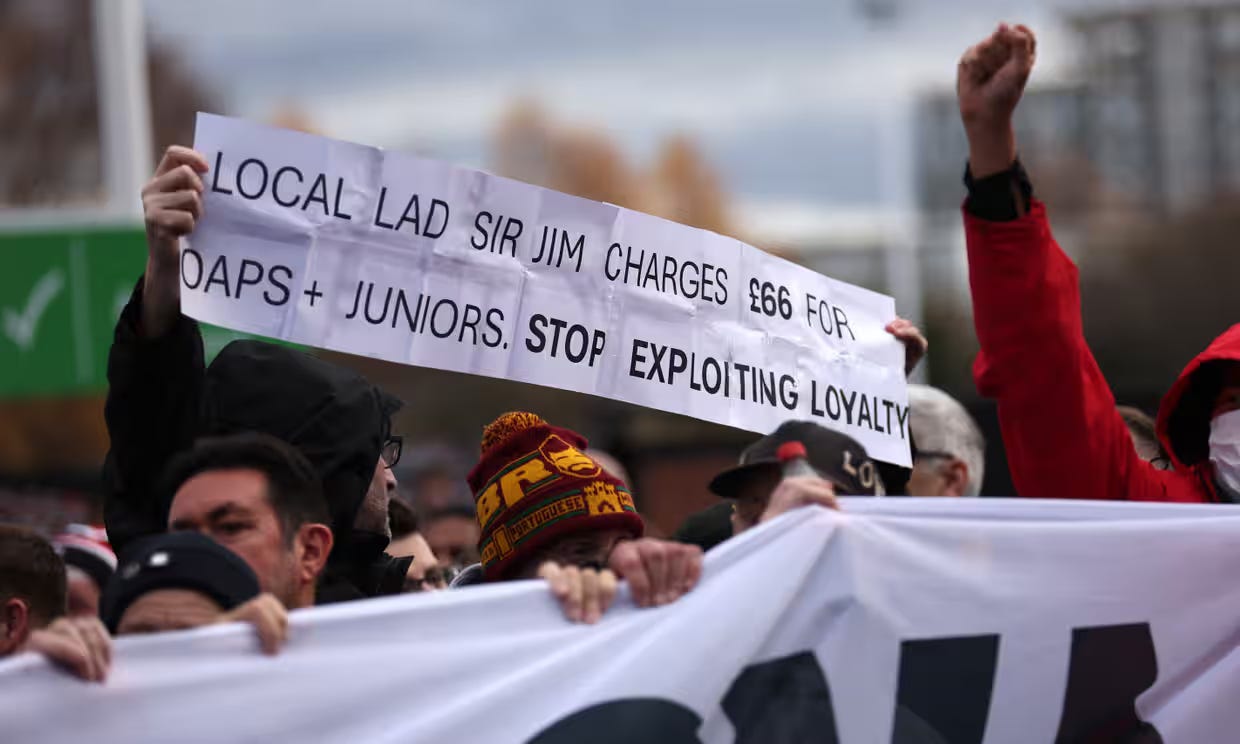The Rising Problem of Premier League Ticket Prices
The EPL prices have skyrocketed, concessions for kids and seniors are vanishing, and the idea of a working-class family attending games together is becoming a thing of the past for many
Haven't subscribed yet? Join our community of sports enthusiasts eager to broaden their understanding of global sports. Whether you're a student, professional, or business owner, our newsletter provides invaluable insights into the sports industry.
Well, This topic is in front of you today thanks to the Be a Good Sport WhatsApp group, where David Bright shared the image below and mentioned that this topic had my blog written all over it. I had already come across that post on Instagram and was planning to write a LinkedIn post/blog about it, but this nudge from the group reinforced my decision to do it right away.
To begin with, I obviously can't delve into travel and hotel expenses, but what we can focus on is the ticketing industry, particularly in the Premier League, where match ticket prices have risen by 800% since 1990. We will discuss how and why clubs have raised prices, leading to fan protests against exploitation, and explore potential solutions to address the issue.
The issue of rising Premier League ticket prices has sparked widespread anger among football fans, who feel increasingly alienated from the clubs they have supported for generations. The backlash against rising ticket prices has united rival fan bases, as seen with Manchester United and Liverpool supporters particularly protesting together earlier in January. This demonstrates that the issue transcends club loyalty and it's about the fundamental right of dedicated fans to afford attending matches. The irony lies in clubs marketing the fierce rivalries that create an electric atmosphere while simultaneously driving out the very fans who sustain it.
Clubs are removing or restricting concession prices for children, students, seniors, and disabled supporters. The groups that traditionally rely on discounted tickets to attend games. For example, Manchester United eliminated its discounted member tickets, increasing some by as much as 164% for kids. This is not only an economic burden but a cultural attack, as it prevents young fans from developing lifelong club loyalty and isolates senior supporters who have been attending for decades.

The revenue increase from these ticket hikes is negligible in the grand scheme of club finances. For instance, financial analysis reveals that Manchester United’s decision to scrap concessions only generates an estimated £16,000 per match—a drop in the ocean compared to their multi-million-pound revenues. The cost of alienating generational fans, however, is immeasurable.
While Manchester United’s decision has drawn particular outrage, they are far from alone. Tottenham, Arsenal, Manchester City, Liverpool, and other clubs have also raised ticket prices, with some exploiting loopholes to minimise their obligations under Premier League rules on concessions. Brentford is a rare exception, showing that clubs can make ethical choices by freezing season ticket prices and introducing affordable options for young fans.
As highlighted in the recent PTI Digital report, changing customer preferences and economic factors also create a challenge in the ticketing market. Fans have always complained about rising ticket prices, but too many sports organisations are highly leveraged, with potential paying audiences much smaller than they imagine. The most recent (August 2024) Football Price Index, published by the Football Supporters’ Association, suggests that ticket prices have increased way beyond the rate of inflation. Using Liverpool as an example, a £4 ticket in 1990 should only cost £9.59 today, but the cheapest tickets are £39. At the same rate of inflation, the FSA estimated a loaf of bread should cost £4.88. The FSA concluded that “ticket prices are a ticking time bomb and club executives have their hands on their ears. Something has to give.
However, it may be that venues are selling out now, but what is the impact in the longer term if we don’t invest in better experiences and more value for money? Given changing behaviours and the pressures on people’s time and money, at what point does the season ticket come under pressure? All of this is set against wage inflation and other rising costs.
Premier League clubs increasingly prioritise corporate hospitality and international tourists over local, die-hard supporters. The logic is simple for them – corporate guests pay more for premium experiences and merchandise. This shift threatens to transform traditional English football culture into a sanitised, commercialised spectacle devoid of its historical passion and authenticity.
English football tickets are among the most expensive in the world. While the average Premier League season ticket costs £594, in contrast, Bundesliga fans pay just £179, and La Liga’s average is £225. Even in elite clubs, Arsenal has the most expensive season ticket in Europe at £1,073. This financial burden discourages families from attending and erodes the generational passing down of fandom.
Protests, coordinated campaigns, and public pressure have shown results in some cases. Arsenal, for example, abandoned plans to scrap senior concessions after backlash from the Arsenal Supporters’ Trust. The historic success of the £30 away ticket cap, achieved through collective fan action, proves that clubs will respond when faced with sustained pressure.
Football clubs are more than businesses because they are deeply embedded in their communities. However, the tradition of entire families attending games together is being eroded, as evidenced by lifelong fans like Martin Feely, who said he can no longer afford to take his grandson to Old Trafford. This severing of generational connections is an existential threat to football’s long-term sustainability.
Clubs claim they must raise prices due to financial pressures, yet their revenues are at record highs. Manchester United generated £662 million last year but still reported a net loss of $148 million, suggesting that the real issue is financial mismanagement, not lack of income. The Football Supporters’ Association rightly argues that “football has a spending problem, not a revenue problem”.
Clubs need to engage in meaningful discussions with supporters rather than making unilateral decisions. Implementing fair pricing regulations, capping ticket prices (as seen with away tickets), and ensuring concessions remain accessible would preserve football’s culture while maintaining profitability. Some clubs, like Brentford and Arsenal, have shown that ethical decisions can be made, setting an example for others to follow.
Eventually, football clubs need to rethink their traditional commercial model and diversify their revenue streams, which will help address this issue or at least attempt to. In my view, the most significant changes need to be made in the sponsorship area. Sponsorships should be driven by data, not just media value, as that is the primary source of revenue that can compensate for lower ticket sales. Rights-holders can achieve this by offering something unique that people can’t find elsewhere. While many have unique assets, the best starting point is their data. Sports have the ability to connect with fans and gather data in ways other industries would love to replicate.
However, as the PTI report highlights, sports are not fully capitalising on this opportunity. Most rights-holders focus on only a small portion of their customer base because they have limited products to offer. In reality, most brands are not particularly concerned with whether someone is a season ticket holder or a casual fan. They care more about things like what car they drive, when their car lease ends, where they like to travel, or who their mobile phone provider is.
Many clubs still lack the use of data and technology to better understand their fans. However, those who have begun to use it effectively have developed digital fan engagement strategies, which in turn create new revenue streams. If clubs want to increase revenue by attracting more fans and boosting engagement, rather than raising ticket prices and calling it a supply-and-demand situation, they can certainly learn from Fortuna Düsseldorf, a German second-division club that increased sponsorship revenue to offset lower ticket prices and created a larger, more engaged fan base. Read about them in this informative article by
Another potential solution could be capping player salaries, which ties into the earlier point about football having a spending problem. Last year, there was talk of the Premier League considering this for the 2025/26 season due to the significance of the issue. A salary cap could help the league in three key ways:
It could set a cap that allows talented players to move up and enables clubs to sign a limited number of "marquee" players outside the cap.
It could help clubs maintain financial solvency, improving the league's financial sustainability under the PSR rules.
The cap could facilitate better commercial negotiations across the league with partners, vendors, and suppliers.
In summary, the Premier League’s ticket pricing crisis is about more than just affordability – it’s about the identity of the sport and its future. Clubs are risking long-term fan engagement for short-term financial gain, but history has shown that organized, collective action from supporters can force change. If teams continue to disregard their core fan bases, they may find themselves with full stadiums but an empty soul.
Some housekeeping stuff
If you can’t find the newsletter, check your Spam folder or Promotions tab, and move this email to your primary inbox. Make sure to mark this email address as ‘not spam’.
Today’s recommended podcast…
In this episode on Overlap, Jamie Carragher is joined by Paul Scholes and special guest and Financial Expert Kieran Maguire, as well as some of the biggest fan channels across England. The discussion dives into the financial side of football, focusing on the rising costs for fans, like ticket price hikes, and how clubs are trying to make money off their supporters.
Kieran Maguire will break down the financial situation at Premier League clubs, and Paul Scholes shares his thoughts on ticket prices at Salford. You'll also hear fan opinions on Manchester United, Crystal Palace, and Everton, plus a look at the disconnect between fans and clubs, especially in the Premier League.
To wrap it up, Kieran answers questions about Manchester City's charges and the financial side of the FA Cup. It’s a deep dive into football’s money matters, with some strong opinions and insights from both experts and fans alike.
Enjoy listening and have a great week ahead!







